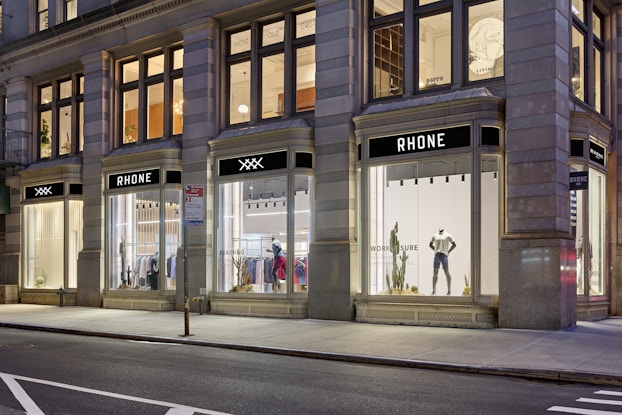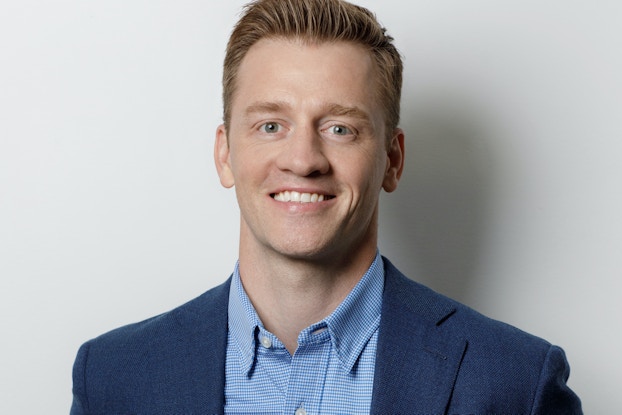
Why it matters:
- Nearly half (48%) of consumers reported that they’ve tossed over their jeans in favor of active or athleisure bottoms.
- A hefty 82% of consumers polled said they wanted work clothing designed to be more versatile so it could be worn commuting, at work and after work.
- Startup Rhone has generated sales growth by filling a void in the men’s apparel market for upscale athleisurewear.
Nate Checketts admits that the idea for his business came from a gift of sweatpants from his mom.
The CEO and co-founder of menswear brand Rhone explained that each Christmas, his mother gifted him, his siblings and all their children matching pajama sets. “It’s a long-standing tradition,” he told CO—.
Then, in 2011, “she went to a prominent women's activewear brand and they had a small men's capsule at the time, and she bought everybody a pair of sweatpants from the store,” he recalled. The gift sparked quite a debate. Checketts’ siblings argued that guys can't wear joggers from a women's yoga brand. “And I was like, ‘The sweatpants seem really comfortable. Why wouldn't I wear this?’”
It didn’t end there. At work, where Checketts was in new business development strategy at the National Football League, his coworkers taunted, “And do you buy your underwear at Victoria’s Secret?”
Checketts would have the last laugh.
Rhone was born to fill an unmet need for high quality, highly innovative sportswear for men that today can be found in over 100 retailers globally, from the likes of Nordstrom to REI. And in the B2C space, “we've become the No. 1 men's partner for Peloton and Equinox,” Checketts noted. The product assortment can take a man from the office to the gym and anywhere in between with a wide range of T-shirts, trousers, joggers and jackets in a full complement of colors and styles. And this month, the six-year-old company, which became profitable last spring, opened its fifth branded store—a flagship in Manhattan’s Flatiron District.
[Read here on athleisure and other consumer trends poised to drive business this year.]
In menswear, serving an unmet need
Those (now, legendary) sweatpants sparked a curiosity to research whether the market had any dedicated men’s athleisure brands—not really, Checketts found, as traditionally Nike, Under Armour and their ilk focused on more technical sportswear and were distributed mostly wholesale to other retailers. What’s more, Checketts discovered, “Almost all of the innovation was happening on the women's side,” where technical fabrics met cross-functional designs for apparel that could easily be worn outside the gym.
For all its high-end construction and adaptability, the women’s apparel carried a much costlier price tag. In addition, customers not only purchased products like Athleta’s or Lululemon’s premium yoga pants, but were also guided by the considerable expertise of those retailers’ in-store and online associates. The bonus, and perhaps the glue, that cemented customer loyalty was that they also could become part of a community that existed online (through sharing photos and other content) as well as offline (in pre-pandemic times for in-person events).
Checketts believed that by catering to men he could create a cash cow that could take its place in the crowded—albeit by women’s wear—athleisure landscape, which was heating up, according to earlier research by Morgan Stanley. The way he and market experts saw it, the world was poised to move to athleisure when Rhone launched in 2014.
Further, he pointed out, he wanted to develop a direct distribution model both online and in-store where relationships could be built with customers. “The thing that got me the most excited is that we could build a brand story and a community that was directly focused on who our customer was.” He argued that women's brands doing men’s capsules weren’t thinking about assortment and fit for guys, when 80% or more of their sales were going to women.
[Read here about building a brand from scratch.]
The thing that got me the most excited is that we could build a brand story and a community that was directly focused on who our customer was.Nate Checketts, CEO and co-founder, Rhone
Building more than a clothing company: ‘There was an opportunity to be a voice for good’
As a serial entrepreneur, Checketts admits that potential to develop a customer community was the driver, especially since he was using his steady employment and a 401k to support his family. “The idea of taking what is ultimately a very gigantic risk and building a company that sold a lot of clothing didn't feel meaningful enough to me,” he said. “I felt there was an opportunity to be a voice for good and to have an overall positive impact.”
Keeping his day job at the National Football League, Checketts raised a $100,000 seed round of investment from friends and family and began developing technical fabrics that would tackle sweat from working out or just running to catch a train, as well as classic styles that could be worn for years. The first few products bore the names of inspirational figures, such as the “Bulldog” in a nod to Winston Churchill and military strategist/philosopher Sun Tzu.
Now, Rhone’s collections range from “commuter pants,” which during quarantines can easily be worn for a cruise to the kitchen from the living room, to tank tops, swim trunks, underwear and, of course, masks.
Technical fabrics range from Polartec to Goldfusion, the latter of which contains precious metal particles designed to ensure the garment holds its color through multiple washes and doesn’t retain odor from sweat.
And in keeping with providing inspiration, the company’s blog, “The Pursuit,” is filled with information on wellness and workouts, playlists and podcasts, charity and activism. Additionally, Checketts pointed out, customers can find great quotes stitched into the hems and waistbands of Rhone apparel.
The core customer he set out to positively influence, is, like him, a 30-something “professional guy, who works hard, plays hard, and is kind of very serious about the way they approach life and adventure.”
[Read here on becoming a socially responsible business.]
That said, Checketts has since heard that these target customers have loved their purchases so much, they bought something for their father or their son, so the brand can be found on anyone from 13 to 80.

Pandemic pivots: Cutting back on inventory while adding virtual appointments
That inspiration and dedication kept Rhone’s business humming during the challenging months of early 2020 when the pandemic first hit. For one, the lease on Rhone’s flagship store had just been signed when it had to be put on hold as non-essential businesses shuttered. Though the company had some $30 million in funding from private equity and other investors, no one was immune to supply chain struggles. “We saw factory shutdowns, challenges in getting trims, zippers, buttons and fabric to our factories,” he said. “In addition to that, consumer spending really plummeted in those first two months.”
Checketts said they moved to cut back on orders for fall and holiday and the executive team took a pay cut just to ensure they could keep going with their staff of 58 full-time employees and 35 part-timers. “We're using our retail staff to do virtual appointments and have almost this concierge type experience,” he added. “We're trying to keep the team gainfully employed and continue to maintain a presence in the community.”
In the end, though, Checketts said once everyone settled into the idea of quarantines and social distancing, 2020 presented “an enormous opportunity for us.” Though he declined to give sales figures, he said the company has fluctuated between low-triple-digit growth and high-double-digit growth since inception and it logged its first profit in the second quarter of 2020.
That’s not surprising. People were still working out, even though it likely was at home, and sweatpants became de rigueur for desk jockeys working remotely. In fact, according to the 2020 Cotton Incorporated Lifestyle Monitor Survey, almost half of consumers polled (48%) reported that they’ve tossed over their jeans in favor of active or athleisure bottoms. Additionally, 82% of consumers said they wanted work clothing designed to be more versatile so it could be worn commuting, at work and after work. Some 34% of these people are so serious about their more casual duds that they’d trade $5,000 in salary for a more relaxed dress code at work.
When it comes to clothing, stores still matter — a lot
Although activewear accounted for 40% of all online purchases last year, according to data from the NPD Group, Checkett’s still bullish on finally opening that flagship store as well. “People forget that some 82% of all clothing pre-pandemic was still purchased in person,” he explained. “So, even if that drops to 50%, that's a substantial amount.”
Whether in-store or online, “the net impact is enormously positive for us just by virtue of the fact that what people are wearing is the exact category that we are known for,” said Checketts. When it comes to the cross between activewear and business attire, “I'm not a huge fan of that term,” Checketts offered. “I definitely prefer ‘performance lifestyle,’ where product is deeply based on performance wear but can be worn across different categories.” This is where he estimates 80% of the world will be, “which is where we've been in from the beginning.”
CO— aims to bring you inspiration from leading respected experts. However, before making any business decision, you should consult a professional who can advise you based on your individual situation.
Follow us on Instagram for more expert tips & business owners stories.
CO—is committed to helping you start, run and grow your small business. Learn more about the benefits of small business membership in the U.S. Chamber of Commerce, here.









